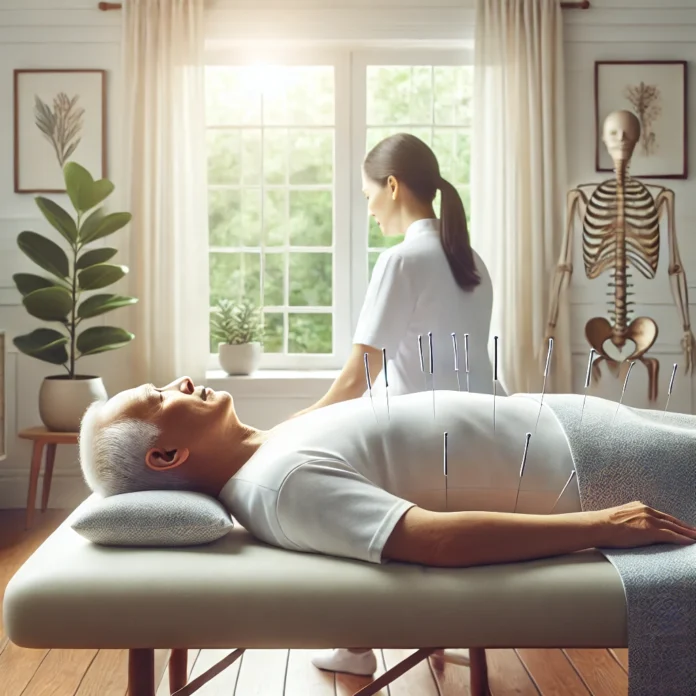Alzheimer’s disease and dementia are life-altering conditions that impact millions of people worldwide, particularly seniors. These neurological disorders lead to memory loss, cognitive decline, and behavioral changes, creating challenges not only for the affected individuals but also for their caregivers. While there is no cure, a growing body of evidence suggests that acupuncture could play a role in easing symptoms and improving quality of life.
This comprehensive article delves into how acupuncture may benefit those with Alzheimer’s and dementia, exploring its mechanisms, research-backed evidence, and practical application.
Understanding Alzheimer’s and Dementia
Before diving into acupuncture’s role, it’s essential to understand these conditions:
- Alzheimer’s Disease: A progressive neurological disorder that causes brain cells to degenerate and die. It is the most common cause of dementia.
- Dementia: An umbrella term for cognitive impairments affecting memory, reasoning, and behavior, often linked to Alzheimer’s, vascular issues, or other causes.
Symptoms can range from mild forgetfulness to severe memory loss, confusion, and inability to perform daily activities. Current treatments focus on managing symptoms and slowing progression, but they often involve medications with side effects.
Acupuncture and Brain Health: The Science
Scientific research has provided compelling insights into how acupuncture may positively affect brain health, especially in the context of Alzheimer’s and dementia. Here’s a deeper dive into the mechanisms:
- Reduction of Beta-Amyloid Plaques: One of the defining characteristics of Alzheimer’s disease is the buildup of beta-amyloid plaques in the brain, which disrupt neural communication and lead to cognitive decline. Studies on animal models have demonstrated that acupuncture can help reduce the accumulation of these plaques by promoting autophagy—the body’s natural process of clearing out damaged cells and proteins.
- Anti-Inflammatory Effects: Chronic neuroinflammation plays a significant role in the progression of Alzheimer’s and dementia. Acupuncture has been shown to regulate the immune response and reduce levels of pro-inflammatory cytokines in the brain. By calming inflammation, acupuncture creates a healthier environment for neurons to function effectively.
- Improvement of Neurotransmitter Function: Neurotransmitters like acetylcholine and dopamine are critical for memory, learning, and mood regulation. Alzheimer’s disease is often associated with a decline in acetylcholine levels. Research indicates that acupuncture can stimulate the production and release of these neurotransmitters, improving synaptic communication and cognitive performance.
- Promotion of Neurogenesis: Neurogenesis, or the formation of new neurons, is vital for maintaining brain plasticity and cognitive function. Acupuncture has been linked to increased activity in the hippocampus—the brain’s memory center—and the stimulation of neural stem cells. This can enhance the brain’s ability to adapt and form new connections, even in the presence of neurodegenerative conditions.
- Enhanced Blood Flow and Oxygenation: Proper blood circulation is essential for delivering oxygen and nutrients to the brain. Acupuncture improves microcirculation by dilating blood vessels and increasing blood flow to areas of the brain affected by Alzheimer’s. Enhanced circulation helps prevent further damage and supports cognitive recovery.
- Regulation of the Hypothalamic-Pituitary-Adrenal (HPA) Axis: Stress and cortisol levels are often elevated in individuals with dementia, exacerbating symptoms. Acupuncture can regulate the HPA axis, lowering cortisol levels and promoting a sense of calm. This stress reduction may indirectly improve cognitive function and overall brain health.
- Reduction of Oxidative Stress: Oxidative stress, caused by an imbalance of free radicals and antioxidants, damages brain cells over time. Acupuncture has been shown to increase the activity of antioxidant enzymes, reducing oxidative stress and protecting neurons from further damage.
- Activation of Specific Brain Regions: Functional MRI (fMRI) studies have revealed that acupuncture stimulates activity in key brain regions associated with memory, emotion, and decision-making. For example, stimulation of acupoints like GV20 (Baihui) and EX-HN1 (Sishencong) has been linked to improved connectivity between brain regions involved in cognitive processing.
Key Acupoints for Alzheimer’s and Dementia
Acupuncture targets specific points on the body to promote healing and balance. For Alzheimer’s and dementia, the following acupoints are commonly used due to their known benefits for brain health and cognitive function:
- GV20 (Baihui):
- Location: At the crown of the head, where the lines from the tops of both ears meet.
- Function: Baihui is a vital point for mental clarity, concentration, and memory. Stimulating this point increases cerebral circulation and improves communication between brain regions.
- EX-HN1 (Sishencong):
- Location: A group of four points surrounding GV20, one inch forward, backward, and to each side.
- Function: These points enhance mental alertness and are often used to treat memory loss, confusion, and difficulty focusing. They work synergistically with GV20 to stimulate brain activity.
- ST36 (Zusanli):
- Location: On the lower leg, four fingers below the knee cap, and one finger-width outside the shin bone.
- Function: Known for boosting overall vitality and energy, ST36 supports healthy circulation and strengthens the immune system. It is also used to reduce fatigue and promote mental clarity.
- HT7 (Shenmen):
- Location: On the wrist crease, in line with the little finger.
- Function: Shenmen is a calming point that helps alleviate anxiety, agitation, and sleep disturbances—symptoms commonly experienced by dementia patients. It is also linked to improving emotional well-being.
- PC6 (Neiguan):
- Location: On the inner forearm, three fingers above the wrist crease between the two tendons.
- Function: This point is used to relieve stress, anxiety, and nausea. It is also thought to enhance brain oxygenation and promote relaxation.
- KI1 (Yongquan):
- Location: On the sole of the foot, in the depression created when the toes are curled.
- Function: Yongquan is grounding and calming, helping to reduce agitation and balance energy flow. It supports relaxation and improves sleep quality.
- DU16 (Fengfu):
- Location: At the base of the skull, in the hollow just above the hairline.
- Function: Fengfu is connected to the central nervous system and is used to enhance cognitive function, reduce headaches, and clear mental fog.
- GB20 (Fengchi):
- Location: At the base of the skull, in the hollows on either side of the spine.
- Function: Fengchi improves blood flow to the brain and alleviates dizziness, headaches, and neck stiffness, which are common in dementia patients.
How These Acupoints Work Together
By combining these acupoints in a personalized treatment plan, acupuncturists aim to address the multifaceted nature of Alzheimer’s and dementia. These points work synergistically to:
- Improve cognitive function.
- Enhance circulation and oxygenation to the brain.
- Reduce stress, anxiety, and agitation.
- Promote restful sleep and emotional balance.
Regular acupuncture sessions targeting these points can lead to noticeable improvements in symptoms and overall quality of life for individuals with Alzheimer’s and dementia.
Practical Benefits of Acupuncture for Dementia Patients
While acupuncture cannot cure Alzheimer’s or dementia, it offers several practical benefits:
- Symptom Relief: Acupuncture can ease symptoms like agitation, insomnia, and anxiety, improving overall well-being.
- Non-Invasive and Drug-Free: For patients sensitive to medication side effects, acupuncture is a gentle alternative.
- Enhanced Caregiver Interaction: By reducing agitation and confusion, patients may engage more positively with caregivers and family members.
- Improved Quality of Life: Regular sessions can lead to better sleep, reduced pain, and a more relaxed state of mind.
Real-Life Success Stories
Stories from families and practitioners highlight acupuncture’s transformative potential:
- Sarah’s Story: Sarah’s father, diagnosed with early-stage Alzheimer’s, experienced noticeable improvements in mood and engagement after acupuncture sessions. He became less agitated and more interactive during family visits.
- David’s Journey: A retired teacher with dementia, David struggled with insomnia and anxiety. Weekly acupuncture sessions helped him sleep better and reduced his reliance on sleep aids.
Combining Acupuncture with Other Therapies
Acupuncture works best as part of a comprehensive care plan. Combining it with these practices can amplify results:
- Cognitive Stimulation: Activities like puzzles, reading, or music therapy complement acupuncture by engaging the brain.
- Dietary Support: Nutrient-rich foods high in antioxidants and omega-3 fatty acids support brain health.
- Physical Exercise: Gentle exercises like yoga or tai chi improve circulation and overall vitality.
- Herbal Medicine: In TCM, herbal remedies are often paired with acupuncture to enhance its effects.
Considerations and Safety
While acupuncture is generally safe, it’s important to consult a licensed practitioner experienced in treating neurological conditions. Additionally:
- Ensure sterile needles are used to prevent infection.
- Discuss all treatments with your healthcare provider, especially if you’re on medication.
Conclusion
Acupuncture offers a promising, holistic approach to managing symptoms of Alzheimer’s and dementia. By improving blood flow, reducing inflammation, and balancing neurotransmitters, it addresses some of the underlying factors contributing to these conditions. While it’s not a standalone cure, acupuncture can significantly enhance quality of life for both patients and their caregivers.
If you or a loved one is navigating Alzheimer’s or dementia, consider integrating acupuncture into your care plan. Consult with a licensed acupuncturist to explore how this ancient practice can support your journey toward improved health and well-being.



